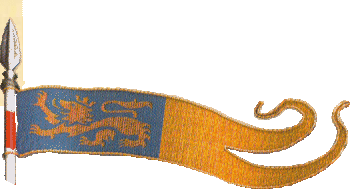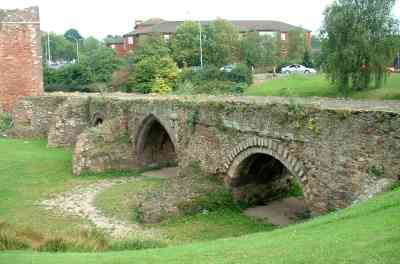

Guibert stood and faced the men in his doorway. "What is the meaning of this sacrilege?"
"You're holding a funeral in here, Prior! You know you don't have the right without discussing it with the canons."
"Who are you? Is that Peter de la Fosse? What do you mean by this intrusion? We can bury this man in our chapel. He has made over his wealth to us already. There is nothing here for you, Canon."
"Don't try to persuade me of that, Prior. You've extorted all his wealth, I have no doubt, and you're welcome to install his body in your cloister when we have done with it, but the cathedral has the monopoly of all funerals still. That man is ours. The candles, the cloth, everything is cathedral property. You'll relinquish it now!"

The medieval bridge over the Exe gave access to the city of Exeter
John frowned and stared at the canon with confusion. It sounded as though Peter was himself unconvinced. He was plainly anxious, nervy, as though he feared that the friars might attack him. Well, that was unsurprising. He was guilty of an unholy intrusion.
"You are performing an act of sacrilege. Leave now."
"We'll leave when we've got our man!"
Guibert's head rose impressively on his shoulders. "My fellow, this is a privileged chapel. You are here without permission and in breach of the peace. Be gone!"
"Prior," the man said, and stepped forward with a fixed stare in his fretful eyes. When closer, he snapped his fingers under the Prior's nose. "I give that for your peace. You're always making it your business to steal our funerals and preach against the cathedral and the Bishop, God bless his soul! Well, it's all going to change now. We won't have it any more."
"Who are 'we'?" Guibert asked mildly.
"The canons. We have new blood in the chapter now, and we won't have any more of this nonsense." He motioned and four sheepish-looking lay denizens of the cathedral close approached, two of them looking nervously at the Prior.
"Well may you look so anxious, my sons. Today you perform the devil's work. You are here to steal the body of a man who desired only to be left in peace after his death. When you remove him, you will take away an unhappy soul. Here he would have lain happily, content after his long life, with our prayers to speed his journey. But you are to interrupt his passage by removing him. He will haunt you for all eternity, my friends." Guibert shook his head sadly.
"Don't listen to him. Take the body and we'll go. Snuff those candles and take them too."
The four began to blow out the candles, pulling them from their spikes and carefully placing them in sacks. One friar interposed himself, but was roughly pushed from their path. He stumbled and fell against a lattice in front of the altar, which broke, the thin dry lathes crackling dustily as he tumbled through it.
John made as though to go and defend the priory's property, but Guibert put out a hand when he heard his movement and gripped his shoulder. "No, no, John. Remain here with me," he said gently. "There is no point in argument or fighting. These ruffians are proof against all moderation."
The body was lifted on its bier, and John watched with his eyes glittering fiercely as it was carried towards them.
"You can have him back when he's had his funeral," the canon sneered. To John's eye he was gaining in confidence now that no one stood against him. "And don't try this sort of nonsense again. I'd have thought you would have learned by now that we won't suffer this infringement of our rights. Our Bishop has his memory still, you know."
"Yes," Guibert said slyly. "And the ear of the King... sometimes. And at other times, he may not. Your Bishop is not long for this world, man. And his excommunication is still in place. It is sad that he has chosen to take all of you with him." He turned to face the approaching bier. "1 am truly sorry, my sons. You will pay with your eternal lives for this dreadful act of violence. Striking a friar in his chapel, breaking our lattice, stealing our candles and ornaments, and taking a body in the process of his funeral... these are terrible crimes. You shall be punished. All will be excommunicate! Now, if you do not fear God, go with your trophies, but remember, no matter what penance you perform for this evil, you can never wash away the sin. You are defiled for ever."
John could see one of the nervous-looking men casting about towards the others, but another in front of him just sneered and spat. "You're a friar, but our Bishop has more power than you! He can overrule any sentence you lay on us. You're the ones breaking the laws, not us."
"He is right," said the canon. "Be grateful that we won't bother to report this. Come, we must return to the cathedral to give this man his funeral. We shall keep the body in St Peter's for a while. Come and collect him when you're ready."
With a last contemptuous glance at the Prior, the man turned on his heel and followed the men carrying the body.
"Prior, I am so sorry," John said as the great door was closed on their arrogant departure.
"Sorry? For what? It is exactly what I expected, and what I wished," Guibert said softly. "Brother, now we have the cathedral where we want them."
The Templar mysteries are set in the tumultuous fourteenth century; England is barely recovering from the civil war which set the barons against the King, and knight against knight. The arrival of the preaching orders of friars introduced a new area of conflict, as the monastic orders struggle to protect their privileges against the newcomers. Michael Jecks comments in his Author's Note that:
One aspect of my books which has caused upset to some readers, I know, is my depiction of the attitudes and behaviour of religious men and women in the early fourteenth century.
For many people (myself included when I first began to research this period) it is hard to believe that those who were supposed to have dedicated their lives to God could have been quite so avaricious, argumentative and violent. However, I have not invented much.
He goes on to give an example of what could happen when interests competed and passions flared up:
Well, the case of Sir Henry de Pomeray shows the problem. He asked permission to be buried in the friary. In 1281 he died, and the friars apparently respected the cathedral's rights and brought the corpse to the cathedral for the funeral service, but then the friars took away all the funerary ornaments, the candles, the money, everything, when they took his body back to be buried. That rankled.
It was 1301 when the friars had Sir Henry Ralegh's body in their church and the canons heard about it. A number of men from the cathedral forced their way into the friary church, beat up some of the friars, broke the lattice, removed the dead man's remains, and incident-ally took the cloth, the wax, the gifts, and all other movables. Back they went to the cathedral, where they held the funeral, and then they carried the body back to the friary so that the friars could actually bury it. Except the friars were by then sulking. To the shame of both groups, the friars locked their gates and refused to let Sir Henry enter to be buried: the canons huffily indicated that it was nothing to do with them, and left poor Sir Henry's remains outside the doors.
These characters were, of course, members of important religious foundations, and yet they were prepared to use a dead man as a bargaining counter. The corpse was left for some little time, until, apparently, the canons skulked back and took him to the cathedral. It would seem that he was buried there, and although it's possible he was later dug up and taken to the friary, it's quite probable that there was no exhumation, and that 'the body of Sir Henry Ralegh still rests under his effigy in the cathedral' (The Franciscans And Dominicans Of Exeter, A. G. Little and R. C. Easterling, Exeter, 1927).
This is the turbulent fourteenth century, the background against which Sir Baldwin de Furnshill and his ally Bailiff Simon Puttock must resolve the mystery of The Butcher of St Peter's
Order The Butcher of St Peter's from Amazon:
- in hardback or
- in the paperback edition.
